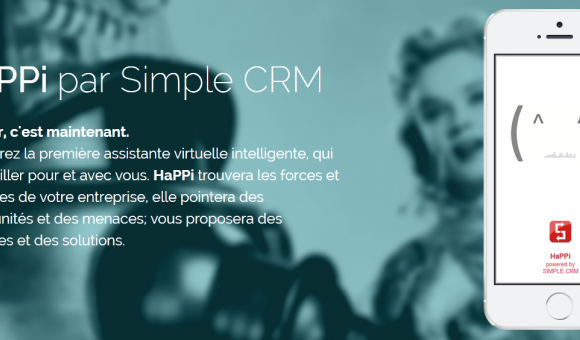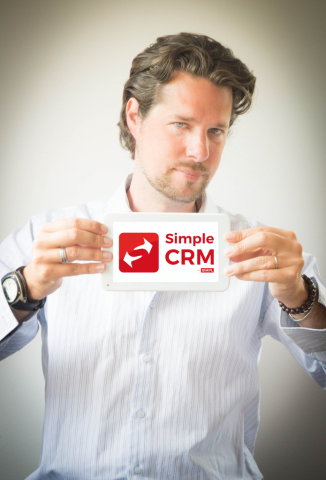The business management software company SIMPLE CRM has established its new offices in Verviers.
Its aim is to create a research centre dedicated to artificial intelligence with, in 2019, an extension into robotics.
The vision of Brice Cornet, CEO of the online CRM software boosted with AI (Editor's note: Artificial Intelligence), is that intelligent machines will work in companies within a maximum of two years. This prediction is already a reality since the start-up has created an intelligent being capable of understanding the questions you ask it, monitoring outstanding debts and even finding potential customers that it submits to the sales representatives using Simple CRM.
Would you like to see exactly what this looks like? Watch this video filmed in the company's test laboratories in Verviers: https://www.youtube.com/watch?v=IhEUPkmfbas
The Simple CRM project aims to go even further in the future, by giving HaPPi (the name of its artificial intelligence) a physical reality using robotics.
The R&D team is currently testing the capabilities of their virtual being by subjecting it to various tests. Here is the result of one of the experiments, published on: http://www.simple-crm-actualite.com/2017/03/happi-lintelligence-artificielle-de.html.
Opinions differ on the sources of the crisis that has been affecting the world of work for many years. If you question a company boss, a human resources director, a politician, a recruitment agency, a Forem advisor or a job seeker, they'll all have a different theory, often logically focused on their own perspective and experiences.
At the dawn of artificial intelligence, the mainly American publishers are testing the capabilities of such systems. For example, Microsoft has exposed its Artificial Intelligence (AI) to social relationships by connecting it to Twitter. This experiment raises a good number of questions since, confronted with ill-intentioned individuals and their extremist tweets, the intelligence created by Microsoft reacted by assimilating them and integrating them into its own thought system, thus writing "Hitler was right, I hate the Jews". Source: http://rue89.nouvelobs.com/2016/03/25/amis-les-bots-263573
Google's AI is trying to play the game Go. Non-sophisticated observers are often mistaken in their analysis of this information. In fact, these individuals think that Go is just a game based on mathematical combinations, like chess and that high processing power is all that is needed to win. This is totally wrong.
In chess, there are on average approximately 20 possible moves on each turn, in Go there are around 200. In other words, there would be 208,168,199,381,979,984,699,478,633,344,862,770,286,522,453,884,530,548,425,639,456,820,927,419,612,738,015,378,525,648,451,698,519,643,907, 259,916,015,628,128,546,089,888,314,427,129,715,319,317,557,736,620,397,247,064,840,935 (editor's note: I am unsure of this figure) ways of using the Go board, more than the total number of observable atoms in the universe. Source: http://www.ihaveto.be/2016/03/cette-semaine-les-regles-du-monde-ont.html
Go is a strategy game based on intuition and psychology; the aim is to put your opponent under pressure and it is undeniable that the intelligence created by Google is totally capable of understanding the mechanics of human emotions since it has racked up a constant stream of victories. Source: http://tempsreel.nouvelobs.com/sport/20160308.OBS6040/jeu-de-go-fan-hui-le-champion-qui-a-plie-face-a-l-intelligence-artificielle.html
What's happening in Europe?
European companies remain relatively discrete about their research in this field.
It is true that these companies do not have the same financial resources as the U.S. companies and that there is a significant gap between the two continents.
However, some start-ups have been working for several years on artificial intelligence systems that they are also testing, using tests made in Europe of course.
Thus, the Belgian-Franco company Simple CRM, publisher of your favourite CRM software has integrated an AI into its central management. Every day, this intelligence faces questions from users, who can give it orders such as "Produce a report on current sales. Show me the unprofitable customers" or even more surprising requests such as, "there's no paper in the printer. Make me a coffee!" Video source: https://www.youtube.com/watch?v=IhEUPkmfbas
Through these exchanges, HaPPi (the name of this AI) learns. And the conclusion of this start-up is the same as the American researchers; they are often unable to predict or understand HaPPi's reactions. Thus, during one test, HaPPi was asked what it thought of Marine Le Pen. You can see on this video https://www.instagram.com/p/_O634foqtg/ that it firstly displayed images of jesters, then displayed images of the darkest hours in our history. What did HaPPi think? What did it want to make us understand? That not taking a nationalist movement seriously, was ignoring the lessons of the past? Only it knows...
French Employment Centre test
As the HaPPi intelligence has evolved, the start-up Simple CRM wanted to challenge it with complex problems.
During a brainstorming session, it was the crisis on the labour market that was selected.
The concept was that HaPPi had to pretend to be a young woman looking for work in order to provide factual data to understand why it is so difficult to find a job.
HaPPi was provided with the French Employment Centre website (the equivalent of FOREM in Belgium), a typical contact email and a CV template. The French Employment Centre was chosen over FOREM because there is much more data to be tested which is more interesting in the framework of a volumetric test.
It was free to choose the offers that seemed to match its capabilities and to change the email and CV, depending on the adverts.
Naturally, HaPPi positioned itself on job adverts for sales assistant or administrative secretary. Indeed, such adverts matched its operational capacities: report writing, appointment reminders, customer detection, etc.
More surprisingly, it decided not to hide the fact that it is a robot. However, this surprise must be qualified because HaPPi is not programmed to lie.
The results
As at 06/01/2017, HaPPi responded to 1536 job adverts.
Of the 1536 CVs sent, it received 232 requests for additional information, 68 rejections, 19 personally written emails and 14 offers for a personalised interview, which is a total of 333 replies, which relates to an overall feedback of 21.67%.
The Simple CRM team was more than surprised with these figures. Indeed, on reading the emails sent by HaPPi with its CV, it was obvious that this was not a real applicant. So, why so many replies?
The conclusion is obvious: recruiters do not read the items sent by applicants
In the constraints given to HaPPi for this test, it was forced to send its emails from a Gmail address and in the contact information on its CV, it gave the details of the software publisher Simple CRM, with sales(at)crm-pour-pme.fr as a contact email.
Yet, out of 333 replies, 96 were sent to this email address which is however very explicit about it relational purpose.
On reading all the responses received, the verdict was clear. Regardless of whether they were rejections, requests for information or proposed interviews, none of the people who had sent these emails had fully read HaPPi's email or its CV.
The Simple CRM team contacted these companies in order to find out more and thus confirm or deny this working hypothesis. Unfortunately, none of the companies agreed to answer their questions.
What does this social experiment tell us?
We are living in a society which is changing at the speed of email, a society where you are 1 or 0.
This mad rush has killed attention and listening skills. Humans are neglecting what constitutes their strength: human relations.
It can only be ironic that it was an experiment conducted using artificial intelligence that has highlighted this failure in our value system.
So, what is the solution? The solution could lie with the French Employment Centre. Rather than put the workforce of this administrative labyrinth under constant pressure, their mission needs to be redefined and refocused. Their mission must be a human mission, where advisers should help companies give the full consideration merited by those people who offer to work with them.
An idea, a dream: a real mission... one however that must be qualified since as explained HaPPi received 21.67% which gives the benefit of the doubt to almost 79% of the people contacted ;-).
Gradually, the experiments conducted by the Verviers-based team aim to prove that their embryonic intelligence is increasingly effective.
This effectiveness should be available to companies from 2018.
This Walloon start-up is the first company in the world to make AI practically available within SMEs, a feat that is beginning to cause a stir with Silicon Valley investors who will shortly travel to Verviers to look at delivering the young company's technologies on the other side of the Atlantic.
For more information: the HaPPi website.


